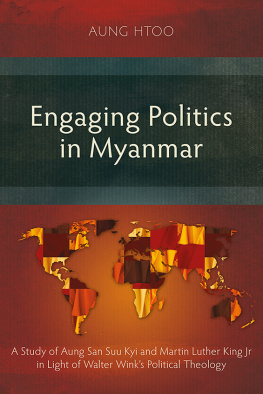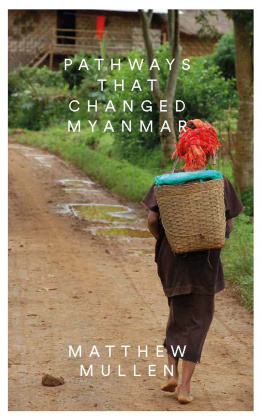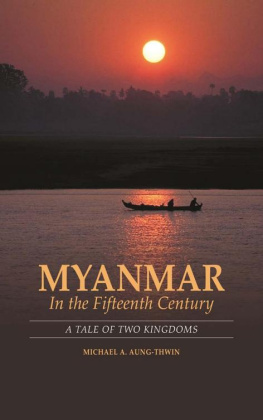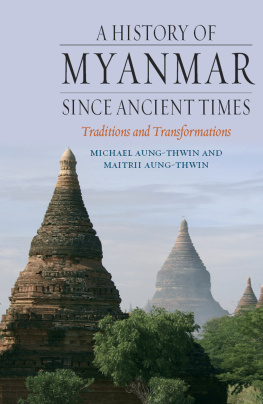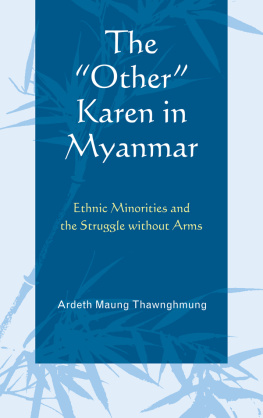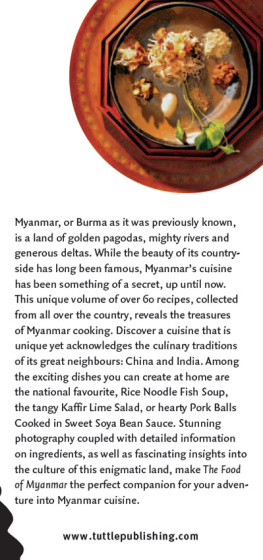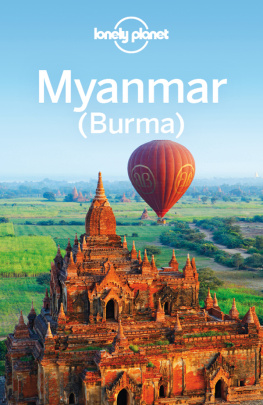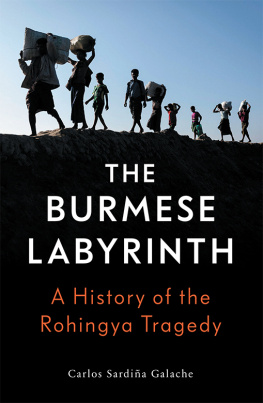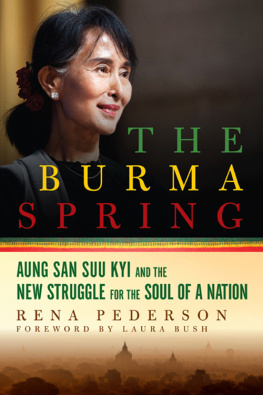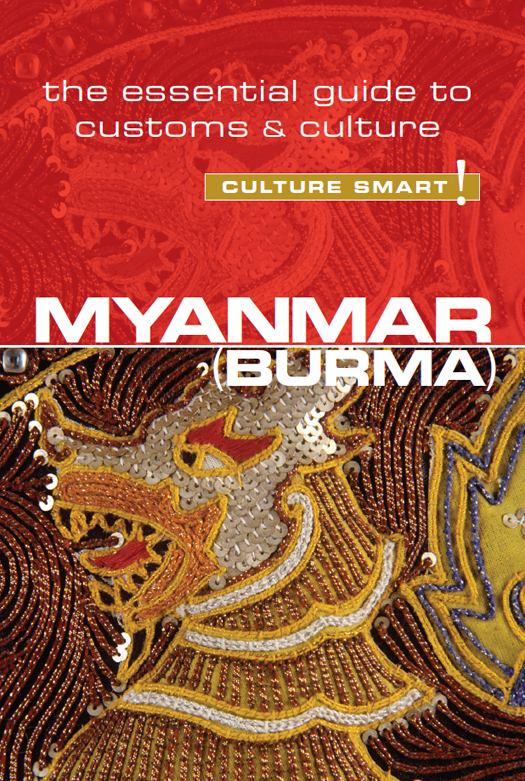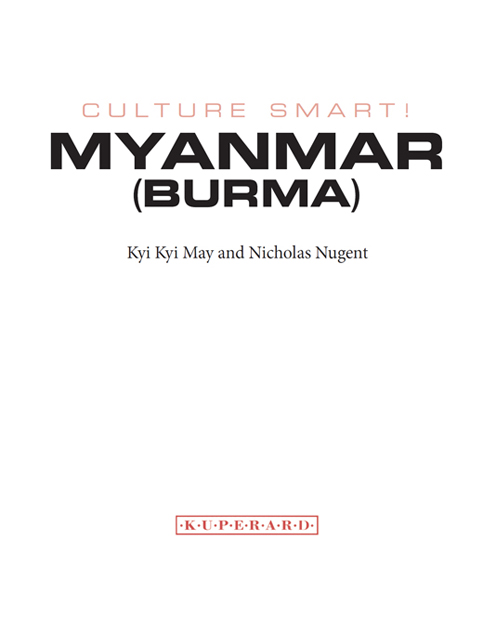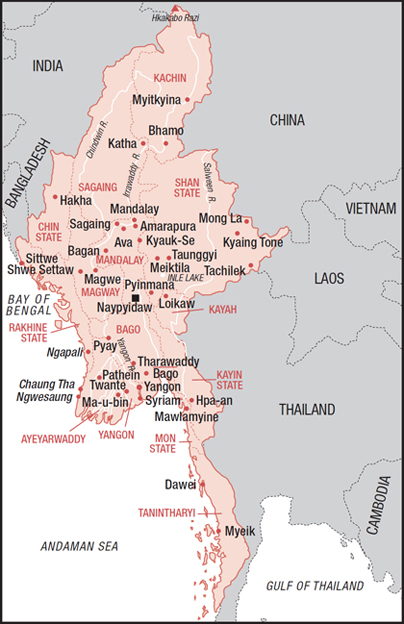Copyright 2015 Kuperard
All rights reserved. No part of this publication may be reprinted or reproduced, stored in a retrieval system, or transmitted in any form or by any means without prior permission in writing from the publishers.
Culture Smart! is a registered trademark of Bravo Ltd.
ISBN 978 1 85733 697 9
eBook ISBN: 978-1-85733-698-6
British Library Cataloguing in Publication Data
First published in Great Britain
by Kuperard, an imprint of Bravo Ltd
59 Hutton Grove, London N12 8DS
Tel: +44 (0) 20 8446 2440 Fax: +44 (0) 20 8446 2441
www.culturesmart.co.uk
Inquiries:
Series Editor Geoffrey Chesler
Design Bobby Birchall
Cover image: Traditional high-relief Myanmar embroidery with sequins. Alamy
Photograph on Ralf-Andr Lettau.
Images on the following pages reproduced under Creative Commons Attribution-Share Alike 4.0 International license: Jacklee.
Creative Commons Attribution-Share Alike 3.0 Unported license: Yarzaryeni.
Creative Commons Attribution-Share Alike 2.5 Spain license: joaquin uy from Seattle.
Creative Commons CC0 1.0 Universal Public Domain Dedication: Foreign and Commonwealth Office.
v3.1
About the Authors
KYI KYI MAY was born and grew up in Myanmar, where she attended Rangoon Arts and Science University and gained an M.Sc. in Zoology. She became a print journalist before joining the BBC Burmese Service in London as a producer and gaining a B.A. (Hons) degree in Politics, Philosophy, and History at Birkbeck College, University of London. As a BBC producer, field reporter, and later head of the Burmese Service (now retired), she has written and broadcast many current affairs and feature programs for Burmese listeners of all ages, including a series of socially focused radio plays dealing with mother-and-child health care issues for Burmese audiences.
NICHOLAS NUGENT gained an M.A. in Law from Cambridge University. He later studied Southeast Asian languages at Londons School of Oriental and African Studies. As a BBC reporter he traveled extensively in Asia and wrote several books, including Rajiv Gandhi: Son of a Dynasty (BBC Books, 1990) and Vietnam: The Second Revolution (In Print, 1996). He now works as a trainer and consultant in journalism and public service broadcasting, which has taken him to many parts of the world, including Afghanistan, Bosnia, Georgia, and the Solomon Islands.
The Culture Smart! series is continuing to expand.
For further information and latest titles visit
www.culturesmart.co.uk
The publishers would like to thank CultureSmart!Consulting for its help in researching and developing the concept for this series.
CultureSmart!Consulting creates tailor-made seminars and consultancy programs to meet a wide range of corporate, public-sector, and individual needs. Whether delivering courses on multicultural team building in the USA, preparing Chinese engineers for a posting in Europe, training call-center staff in India, or raising the awareness of police forces to the needs of diverse ethnic communities, it provides essential, practical, and powerful skills worldwide to an increasingly international workforce.
For details, visit www.culturesmartconsulting.com
CultureSmart!Consulting and CultureSmart! guides have both contributed to and featured regularly in the weekly travel program Fast Track on BBC World TV.
contents
Map of Myanmar
introduction
Myanmar, formerly known as Burma, is the largest country in Southeast Asia. Its population of just over fifty-three million is a culturally rich mix of more than a hundred ethnic groups and dialects. Strategically situated between the worlds two most populous nationsChina and Indiait has a distinctive ancient culture, sharing traditions with both neighbors.
Burma was known as the rice bowl of Asia in the late 1950s, and was the leading economic state of the region when its fledgling democratic government was deposed by a xenophobic military dictator who, within three decades, transformed it into a pauper state. Hidden away from the eyes of the world by their military rulers policy of self-isolation, the Myanmar people became miserable in a country that for many was turning into a big prison. After enduring years of hardship and military suppression with khanti (patience), the people came out on to the streets on a Monday morning in August 1988. What became known as the 8-8-88 Uprising was a political turning point. Even so, the people suffered for another quarter of a century under different military rulers before Myanmar finally emerged from its dark days, electing a new, mainly democratic, parliament in 2012, although seats are still reserved for military representatives.
A quasi-civilian government was formed, and today further democratic reforms are under way as Myanmar approaches fresh elections. Its most famous political detainee, Aung San Suu Kyi, the Nobel peace laureate, who was released after nearly twenty years of house arrest in 2010, is now a parliamentarian in the Pyithu Hluttaw, or parliament, and chairs its Law, Order, and Peace Committee. The present administration faces teething problems in politics, governance, education, its dealings with a multiplicity of ethnic communities, and its society. At the same time, progress has been made with the emergence of a mainly free press, the release of political prisoners, the ongoing peace process with many regional ethnic armed groups, and the reemergence of the long-lost voice of the man and woman in the street.
Myanmar people are by nature friendly and polite, and are traditionally easygoing. The majority of the population are devout Buddhists, and there are pagodas and meditation centers all over the country. You see monks in saffron robes everywhere you go. Generally, people are quite happy if they have a roof over their heads and food on the table. Although they have yet to taste the fruits of democracy fully, they have high hopes of a bright future for their children if democratic values take root in the country.
While your hosts will be naturally polite and accommodating, you may have to go through a steep learning curve to understand the dos and donts of Myanmars social customs. Culture Smart! Myanmar provides vital insights into the inner life of the people, their history, traditions, attitudes, and work ethic, and gives practical advice on what to expect and how to behave in different circumstances. It offers you a starting point to discover for yourself the charms of this beautiful, resource-rich, and intriguing country.
Key Facts
| Official Name | Republic of the Union of Myanmar | Pyidaungsu Myanma Naing Ngan |
| Capital City | Naypyidaw (since 2004) | Pop. 1 million (est. 2014) |
| Business Center | Yangon (Rangoon), the former capital | Pop. 6 million (est. 2014) |
|


